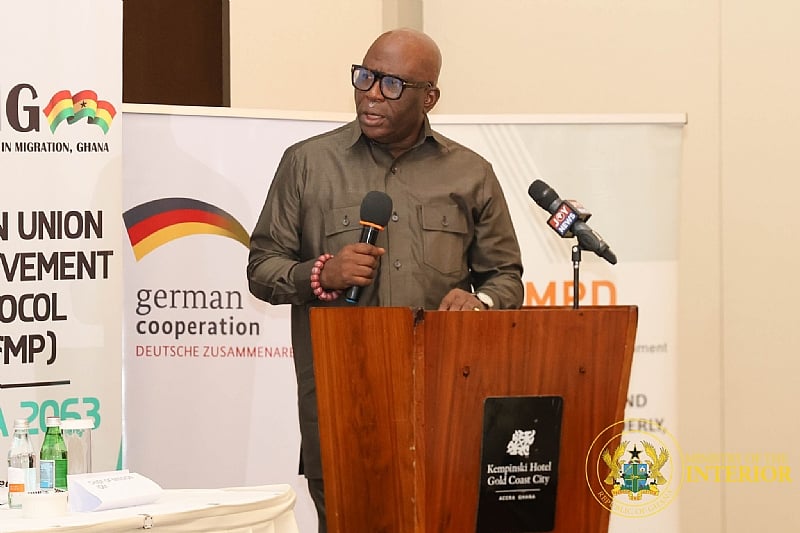Ghana’s recent hosting of a National Dialogue on the African Union Free Movement of Persons Protocol signifies a pivotal step towards realizing the African Union’s vision of a unified and integrated continent. This landmark dialogue brought together diverse stakeholders, including representatives from the African Union, ECOWAS Commission, GIZ Ghana, ICMPD, IOM Ghana, civil society organizations, and Ghanaian state institutions, reflecting a collaborative approach to tackling the complex issue of migration within Africa. The dialogue served as a platform for in-depth discussions on the Protocol’s implementation, addressing both its potential benefits and the inherent challenges that need to be overcome. By initiating this national conversation, Ghana has demonstrated its commitment to fostering intra-African mobility and cooperation, setting a precedent for other member states to follow.
The dialogue’s focal point was the African Union Free Movement of Persons Protocol, a key instrument aimed at facilitating the free movement of people across the African continent. This protocol recognizes the multifaceted nature of migration within Africa, driven by a range of factors including economic opportunities, social networks, environmental pressures, conflict, and established trade routes. Effective governance of these migration flows is crucial to ensure that movement within the continent is both sustainable and humane. The discussions highlighted the fact that intra-African migration significantly surpasses migration outside the continent, emphasizing the need for robust policies and frameworks to manage this internal movement effectively. The dialogue sought to identify strategies to maximize the benefits of free movement while mitigating potential risks.
Ghana’s recent implementation of a visa-free policy for all African passport holders was highlighted as a concrete step towards fostering closer continental ties. This policy underscores Ghana’s commitment to the principles of free movement and Pan-Africanism. By removing visa requirements, Ghana aims to encourage greater interaction among African citizens, promoting the exchange of skills, boosting intra-African trade, and strengthening people-to-people connections. These enhanced interactions are viewed as essential building blocks for a truly integrated African community, where individuals can move freely, contribute their skills and talents, and contribute to economic growth across the continent. The visa-free policy serves as a tangible example of Ghana’s proactive approach to realizing the goals of the Free Movement of Persons Protocol.
Despite the potential benefits of free movement, the dialogue also acknowledged the existing challenges that need to be addressed. These challenges include policy inconsistencies between member states, infrastructural limitations that hinder seamless movement, administrative bottlenecks that create bureaucratic hurdles, and security concerns related to cross-border movement. Overcoming these obstacles requires coordinated collective action from African states, involving policy harmonization, infrastructure development, streamlining administrative processes, and strengthening regional security cooperation. The dialogue served as a platform for identifying these challenges and exploring potential solutions through collaborative efforts.
The Deputy Minister for Interior, Mr. Ebenezer Okletey Terlarbi, underscored the urgency of accelerating the ratification and domestication of the Free Movement of Persons Protocol. He emphasized that the Protocol’s implementation is not merely a bureaucratic process but a crucial step towards achieving sustainable development and fulfilling the ideals of Pan-Africanism. By ratifying and domesticating the protocol, African states demonstrate their commitment to creating an environment conducive to free movement, promoting economic integration, and fostering a sense of shared identity and purpose among African citizens. Mr. Terlarbi’s call to action highlighted the need for renewed commitment from all stakeholders to expedite the implementation process.
The National Dialogue on the African Union Free Movement of Persons Protocol served as a crucial platform for advancing the agenda of continental integration. By bringing together diverse stakeholders, the dialogue fostered open discussions on the benefits, challenges, and practicalities of implementing the Protocol. Ghana’s proactive stance on free movement, exemplified by its visa-free policy, sets a positive example for other African nations. Overcoming the identified challenges requires a concerted effort from all member states, focusing on policy harmonization, infrastructure development, and addressing security concerns. Ultimately, the successful implementation of the Protocol will contribute significantly to realizing the African Union’s vision of a united and prosperous Africa, where people can move freely, contribute their skills and talents, and drive economic growth across the continent. The dialogue marks a significant milestone in this ongoing journey towards continental integration.














